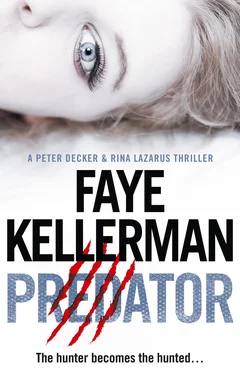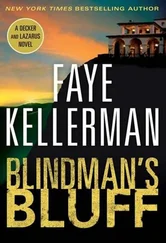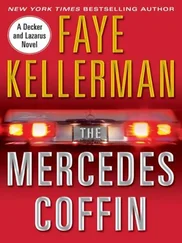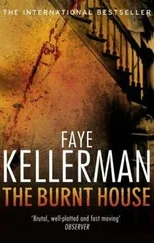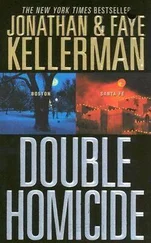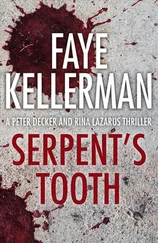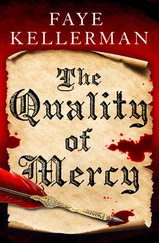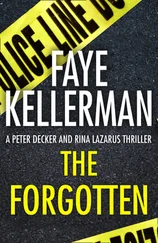“Which is?”
“Getting a ring.”
Oliver’s eyes widened. “Nice.” A pause. “I hope not too soon.”
Marge’s smile was genuine. “Not immediately, no.”
“That’s good.” Oliver bit his lip. “I mean … it’s good to take your time.”
“We’ve been working together for years, Oliver. Say it out loud. You’d miss me.”
“I would miss you.” He meant it. “I hope you’re not contemplating a move to Santa Barbara?”
“Not at the moment.”
“He’s moving to L.A.?”
Marge said, “That would be a no as well. Right now we’re okay with the arrangement.”
“Good deal from where I’m sitting.” He was visibly relieved.
“Aw … you care.”
He squirmed and changed the subject. “What kind of ring?”
“He’s resizing his late mother’s old diamond—three-carat emerald cut.”
“That’s the real deal.”
“Yes it is.”
“Good for you, Marge. I’m happy for you.”
“Thank you, Scott. I’m happy, too. I’ve got a good guy. I know that the ring’s only a symbol, but it’s still nice. Not only will it look pretty on my finger, but jewelry is always a good investment in times of economic uncertainty.”
Sabrina Talbot lived behind gates in a multi-million-dollar estate house on multiple acres with multimillionaires and a few billionaires as neighbors. The structure wasn’t visible from the road. It was masked behind a forest of trees and iron fencing. The metal pickets had been forged into seven-foot-high helmeted men sporting pikes. Directly behind the fencing were rosebushes, sprouting thorns on each branch. Every ten feet or so were brick pilasters topped with decorative lights and security cameras. The guard house bisected the driveway to the house. Marge stopped in front of the gate and rolled down the driver’s window. The sentry pulled back a door revealing a very big man: around six feet three with at least 275 pounds of fat and muscle. His bluish black skin tone spoke of Africa, so Marge wasn’t surprised when he spoke with an accent.
“How can I help you?”
“I’m Sergeant Marge Dunn and this is my partner, Detective Scott Oliver. We’re from LAPD, and we’re here to see Sabrina Talbot. Her secretary set up an appointment today at eleven.”
“One moment.” The door slid shut. It took several minutes. The guard stayed ensconced in his protective chamber, but the gates parted majestically. Directly in front was a golf cart with a sign on the back that read: follow me.
They rode an asphalt trail that cut through acres of greenery—silvery olive trees, California oak, bare sycamores, and varieties of menthol-exhaling eucalyptus, all of the trees underplanted with thick foliage and bushes. Eventually the specimen trees gave way to acres of avocado groves: evergreens with dark green polished leaves and gnarled trunks. A pale blue sky held filmy clouds. The air was mild and perfumed.
It was taking a very long time to reach the house, but that could have been the fault of the golf cart, which was ascending at a particularly slow rate. Finally there was a clearing of newly sod lawn and surgical landscaping, hedges trimmed to a precise ninety-degree edge, and symmetrical flower beds of deep jewel hues of pansies and primroses.
Every queen has her castle, and Sabrina’s three-story stone Tudor estate came complete with mullioned windows and a turret. The cart stopped, and two uniformed valets came rushing over to open the car doors.
Marge and Oliver stepped out of the car. She said, “Do I need a ticket?”
The valet stared at her. Another giant of a man answered in the valet’s stead. “No, you don’t need a ticket. I’ll escort you inside.” He held out a hand. “Leo Delacroix.”
“Like the artist?” Marge asked.
“Same spelling. No relation.” His touch for a big man was surprisingly light. “This way. You’re right on time. Ms. Talbot is a stickler for punctuality.”
“Then we have a lot in common.” Marge looked around as they walked to a two-story iron front door. “Although we probably have a lot more not in common.”
Delacroix’s face remained stony. He pressed a button, and the full chorus of Beethoven’s “Ode to Joy” resonated through speakers. The doors split and a third guard took over. He was young, white, and muscular with a thick neck and a military buzz cut for hair. He introduced himself as Thor Weillsohn, leading them down a marble hallway into a reception room, modest in size but not in ornamentation. The furniture was all-white curlicue legs and backs, upholstered in jacquard blue silk. Persian rugs lay over a parquet walnut floor, and tapestries hung from white paneled walls. Angels and cherubs hovered above in a sky filled with puffy clouds.
“Ms. Talbot will be with you in a minute,” Thor told them. He left, closing two white paneled doors behind him. Both of them remained standing, neither wanting to park a butt on something that was breakable and/or priceless. Oliver let out a low whistle.
Marge said, “I guess Hobart gave her a decent settlement.”
“How old is this woman?”
“In her fifties. She was in her twenties when she married him.”
“She did well.”
Another minute passed, and then the doors opened. This time it was a uniformed maid carrying a tea and coffee service, three cups and saucers, and a plate of cookies. “Please have a seat on the divan.”
Marge and Oliver looked at each other and sat down simultaneously on what they thought was the divan. It wasn’t padded much and was ramrod stiff on the back.
The housekeeper said, “May I pour for you?”
“Thank you,” Marge said. “That would be lovely.”
“Tea or coffee?”
“Coffee. Just milk.”
“Same for me,” Oliver said. “Thank you.”
She set the service down on a table and poured in silence. Then she passed around the cookie tray. They each took one out of politeness and placed it on the saucer. The maid put the cookie plate and napkins on a coffee table, and then she left.
“This is all good stuff,” Oliver said. “Do you think if I turned on enough charm, Ms. Talbot might give me a roll in the hay?”
“No.”
“Don’t be too vague, Dunn. Tell me what you really think.”
“I like this lemon bar. If I didn’t think I was being watched, I’d sneak a few up in a paper napkin and hide them in my purse.”
Oliver laughed. Five more minutes passed and then a rush of wind burst through the doors. The detectives stood up.
The woman was a presence: over six feet with broad shoulders, slim hips, and a mane of blond hair. She had blue eyes, high cheekbones, and pale skin. There was spiderwebbing at the corners of the eyes and mouth, but none of that shiny stretched skin common to plastic surgery. She was dressed in a dirty shirt and gardening pants, a floppy hat on her head. She tossed the chapeau on the French furniture.
“Gawd, I’m a mess.” She checked her hands then offered them to Marge and Oliver. “Sabrina Talbot. Sorry about the dirty fingernails. Even with gloves, I lunched my French manicure. Nails and gardening don’t mix.” She brushed off her pants, bits of dirt falling on the Persian rug, and then sat down on a chair. “Sit, sit. And don’t worry if you spill. I reupholster the furniture every two years. It’s about that time. I’m thinking of going deco. I was in my ‘ice’ phase when I did this room. Now it reminds me of an igloo. Sit, sit.”
The detectives sat, introduced themselves with each of them giving her a card.
“I know that you’re here about Hobart.” A single tear down the cheek. “Who would want to harm an eccentric old man?”
“So you know he was murdered,” Marge said.
“Gracie phoned me last night. It was a brief conversation, and she was also short on the details. I’m hoping you can fill me in on what happened.”
Читать дальше
